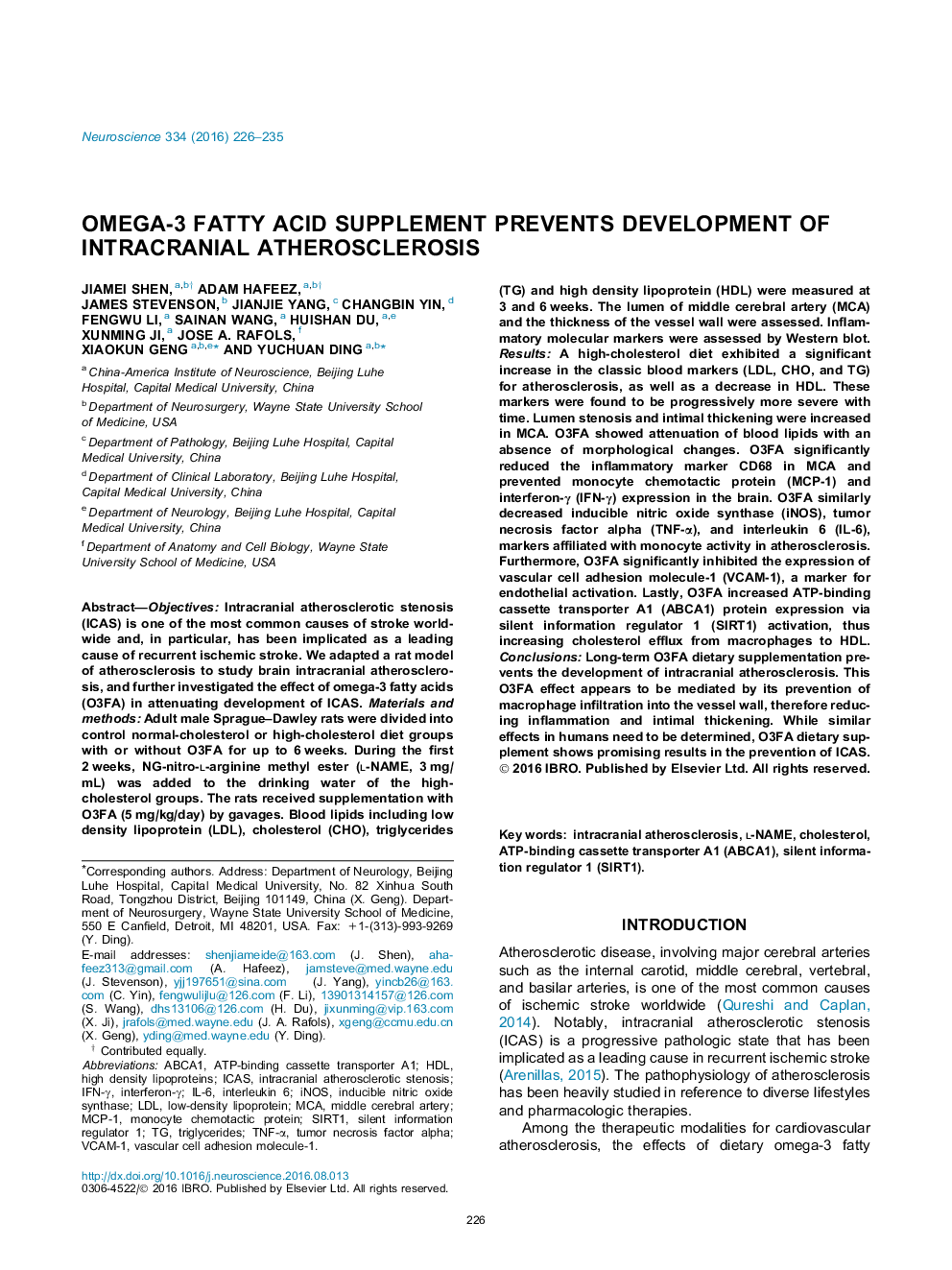| کد مقاله | کد نشریه | سال انتشار | مقاله انگلیسی | نسخه تمام متن |
|---|---|---|---|---|
| 6270788 | 1614742 | 2016 | 10 صفحه PDF | دانلود رایگان |
- Beneficial effects of omega 3 fatty acid on intracranial atherosclerosis.
- Similar effects of omega 3 fatty acid on intracranial and cardiovascular vessels.
- Omega 3 fatty acid significantly reduces inflammatory markers in the brain.
Objectives: Intracranial atherosclerotic stenosis (ICAS) is one of the most common causes of stroke worldwide and, in particular, has been implicated as a leading cause of recurrent ischemic stroke. We adapted a rat model of atherosclerosis to study brain intracranial atherosclerosis, and further investigated the effect of omega-3 fatty acids (O3FA) in attenuating development of ICAS. Materials and methods: Adult male Sprague-Dawley rats were divided into control normal-cholesterol or high-cholesterol diet groups with or without O3FA for up to 6 weeks. During the first 2 weeks, NG-nitro-l-arginine methyl ester (l-NAME, 3 mg/mL) was added to the drinking water of the high-cholesterol groups. The rats received supplementation with O3FA (5 mg/kg/day) by gavages. Blood lipids including low density lipoprotein (LDL), cholesterol (CHO), triglycerides (TG) and high density lipoprotein (HDL) were measured at 3 and 6 weeks. The lumen of middle cerebral artery (MCA) and the thickness of the vessel wall were assessed. Inflammatory molecular markers were assessed by Western blot. Results: A high-cholesterol diet exhibited a significant increase in the classic blood markers (LDL, CHO, and TG) for atherosclerosis, as well as a decrease in HDL. These markers were found to be progressively more severe with time. Lumen stenosis and intimal thickening were increased in MCA. O3FA showed attenuation of blood lipids with an absence of morphological changes. O3FA significantly reduced the inflammatory marker CD68 in MCA and prevented monocyte chemotactic protein (MCP-1) and interferon-γ (IFN-γ) expression in the brain. O3FA similarly decreased inducible nitric oxide synthase (iNOS), tumor necrosis factor alpha (TNF-α), and interleukin 6 (IL-6), markers affiliated with monocyte activity in atherosclerosis. Furthermore, O3FA significantly inhibited the expression of vascular cell adhesion molecule-1 (VCAM-1), a marker for endothelial activation. Lastly, O3FA increased ATP-binding cassette transporter A1 (ABCA1) protein expression via silent information regulator 1 (SIRT1) activation, thus increasing cholesterol efflux from macrophages to HDL. Conclusions: Long-term O3FA dietary supplementation prevents the development of intracranial atherosclerosis. This O3FA effect appears to be mediated by its prevention of macrophage infiltration into the vessel wall, therefore reducing inflammation and intimal thickening. While similar effects in humans need to be determined, O3FA dietary supplement shows promising results in the prevention of ICAS.
Journal: Neuroscience - Volume 334, 15 October 2016, Pages 226-235
